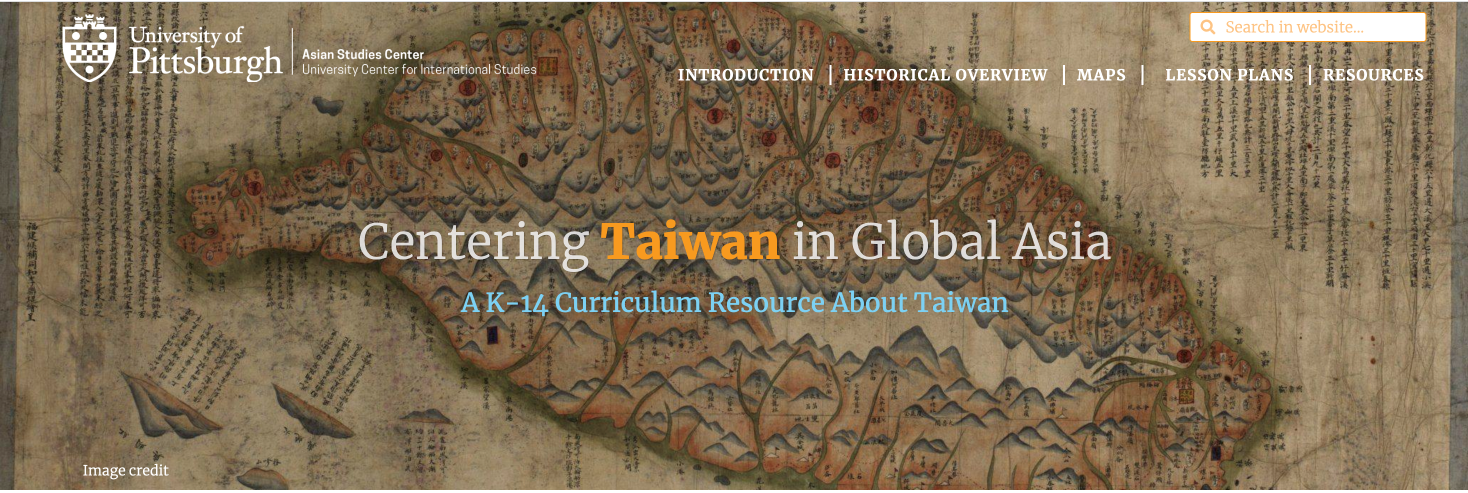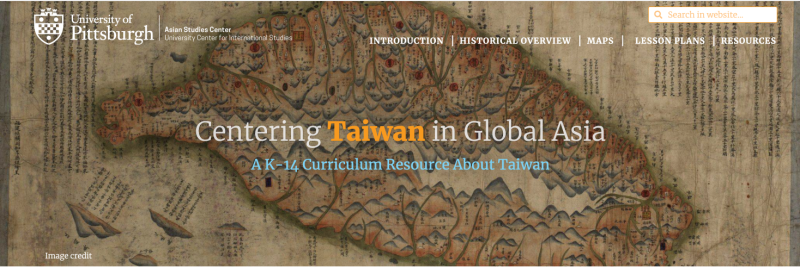The Association for Asian Studies awards University of Pittsburgh’s Centering Taiwan in Global Asia website an Honorable Mention for the 2023 Buchanan Prize

A team at the Asian Studies Center of the University of Pittsburgh developed an interactive website—Centering Taiwan in Global Asia: A K–14 Curriculum Website about Taiwan—that provides a content-rich digital resource for classroom use and helps fill a gap in humanities curricula about Taiwan. The term “K–14” covers K–12 and the first two years of undergraduate study. The website —https://centeringtaiwan.pitt.edu/—was awarded an Honorable Mention for the 2023 Franklin R. Buchanan Prize for Curricular Materials by the Association for Asian Studies (AAS) to “…recognize an outstanding pedagogical, instructional, or curriculum publication designed for K-12 and college undergraduate instructors and learners.” The award was presented at the AAS national meeting in March.
The website is part of the 3-year Centering Taiwan in Global Asia project that the Asian Studies Center at the University of Pittsburgh in Pennsylvania has been implementing since mid-2020 with the support of the Ministry of Education. It has also held many Taiwan related lectures, set up two new Taiwan related courses—Taiwan Diaspora, and Modern Taiwan 1590–1980—and screened Taiwan films, as well as promoting Taiwan Studies within the university and at neighboring educational institutions. In the words of the Center’s director Joseph Alter, this is to “introduce the island’s unique culture and history to a broader audience of teachers, students, and the general public.”
The Taiwan Studies team at the Asian Studies Center gave special attention to designing materials and methods for teaching Taiwan’s history, to help develop courses for students in elementary and secondary schools in Pennsylvania. In consultation and collaboration with scholars of Taiwan’s history, Catherine Fratto, Lynn Kawaratani, and Evan Dawley developed the interactive website to provide a content-rich digital resource for classroom use and help fill a gap in humanities curricula about Taiwan.
The website introduces the rich, contoured history of the island of Taiwan since the 15th century, and its role as a nexus for global trade and conquest by outside powers, by exploring the themes of Indigeneity & Early Settlement; Navigation, Trade & Piracy; and Colonization. The Indigeneity & Early Settlement section gives outlines of some of Taiwan’s early inhabitants—for example, the Atayal, Seediq, and Paiwan communities—and Hakka and Hoklo migration from mainland China in waves in the 17th century CE. The section on Navigation, Trade & Piracy presents the stories of some important individuals in Taiwan’s history, such as Zheng Zhilong and Koxinga. The Colonization section presents the outside powers—including the Dutch and Spanish—that sought to control Taiwan for both its natural resources and strategic importance.
The website developers consider that Taiwan’s rich, complex history and its increasingly significant role in today’s global geopolitical, and economic and trade landscape make it essential for Taiwan to be included in K–12 and undergraduate curricula. An important component of the website is its educator-focused content, developed to assist educators to incorporate Taiwan into their courses. This includes the Introduction and Historical Overview pages, lesson plans with specific activities and strategies for using various website pages in classrooms; a Resources area with a section on Bringing Taiwan into the Classroom, and a section on Resources for Educators and Students; and a PowerPoint slide presentation that outlines Taiwan’s history.
The website is visually rich and inviting to encourage teachers and students to fully utilize and interact with it and enrich their understanding of Taiwan and its significance.

